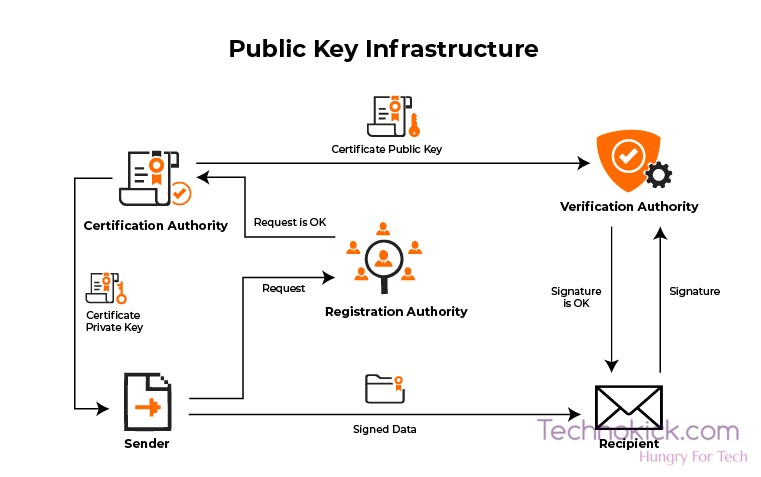DevOps has been on the rise in recent years, and for a good reason. This methodology enables businesses to ship software faster and more efficiently than ever before. But DevOps would not be possible without the help of PKI. This blog post will explore eight PKI platforms that have improved DevOps, including Keyfactor and others.
What is PKI?
PKI, or public key infrastructure, is a system of digital certificates and encryption that allows businesses to secure their data and communication. PKI uses a combination of asymmetric and symmetric encryption to ensure that only the intended recipient can read the message. This makes PKI an essential part of any DevOps strategy.
The Importance of PKI
PKI is essential for DevOps because it provides a secure way to communicate between different parts of the system. For example, when developers need to push code to production, they need to be able to do so securely. PKI allows them to do this by encrypting the code as it is being transferred.
This protects the code from being intercepted by malicious actors and ensures that only the intended recipient (in this case, the production server) can decrypt and read the code. This is essential for maintaining the security of the system as a whole.
Many different PKI platforms are available, each with its strengths and weaknesses. In this blog post, we’ll explore eight different PKI platforms that have improved DevOps.
Keyfactor
Keyfactor is a PKI management platform that enables businesses to secure their data and communication. Keyfactor’s unique approach to PKI combines the convenience of a cloud-based solution with the security of an on-premises solution. This makes it an ideal platform for businesses looking to adopt DevOps.
AWS Certificate Manager
AWS Certificate Manager is a cloud-based certificate management service that makes it easy to provision, manage, and deploy SSL/TLS certificates on AWS. ACM eliminates purchasing, deploying, and maintaining your certificate authority (CA). With ACM, you can request a certificate, deploy it on AWS resources such as Elastic Load Balancers or Amazon CloudFront distributions, and let ACM handle certificate renewals automatically. You can also use ACM to import certificates from other CAs authorized by Amazon Trust Services (ATS). AWS Certificate Manager is a fully managed service available at no additional charge.
Azure Key Vault
Azure Key Vault is a cloud security service that provides a central place to manage secrets such as passwords, API keys, and SSH keys. Secrets can be stored safely in an encrypted format and backed up in Azure storage. Azure Key Vault makes it easy to rotate secrets regularly and monitor secret access with audit logs. Azure Key Vault is available in all public Azure regions at no additional charge.
Cloudflare Certificate Authority
Cloudflare offers a free TLS Certificate Authority that anyone can use to secure their website. The Cloudflare CA issues certificates compatible with all major browsers and is trusted by default in most browser root stores. The Cloudflare CA is also unique because it allows you to deploy certificates automatically using DNS records instead of traditional manual methods like uploading files to your web server. Cloudflare’s TLS Certificate Authority is available at no cost.
Let’s Encrypt
Let’s Encrypt is a free, open-source project that provides free SSL/TLS certificates for 90 days. Let’s Encrypt certificates are compatible with all major browsers and are trusted by default in most browser root stores. Let’s Encrypt makes obtaining and deploying certificates easy by providing simple tools and APIs. Certificates from Let’s Encrypt expire after 90 days but can be easily renewed using the certbot tool.
Symantec Certificate Intelligence Center
The Symantec Certificate Intelligence Center (CIC) provides real-time visibility into the issuing and revocation of SSL/TLS certificates worldwide. CIC uses data from over 150 million live websites to track global certificate issuance and revocation trends. CIC also offers tools for managing your website’s SSL/TLS certificates, including inventory management, expiry alerts, and automatic renewal. The Symantec Certificate Intelligence Center is available at no cost.
Thawte SSL Management
Thawte SSL Management is a cloud-based platform for managing your organization’s SSL/TLS certificates. Thawte SSL Management simplifies certificate management with consolidated billing, automatic renewal, inventory management, and expiry alerts. Thawte SSL Management also offers 24/7 support from experts. Pricing for Thawte SSL Management starts at $149 per year.
VenafiCloud
Venafi Cloud is a SaaS platform for managing your organization’s SSL/TLS certs with features like two-factor authentication, adaptive authentication, searchable audit logs, role-based access controls, and IP whitelisting. Venafi Cloud also includes a REST API for integration with third-party tools.
Conclusion
The platforms mentioned above have all changed the DevOps game in one way or another. Each platform has its own unique set of features and pricing models. When choosing a platform, it is crucial to consider your specific needs and requirements.


